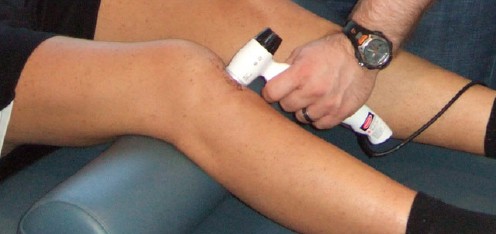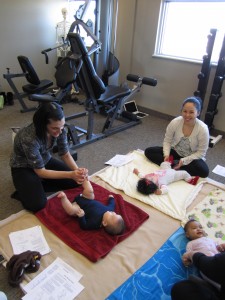I have been practicing massage therapy for many years now and in that time I have been asked the same question by so many new mommies, “Can massage help my baby?” Well, this question has prompted me to write this current blog and my answer is “YES, ABSOLUTELY!” Massaging your baby is the best time to bond with your child and it will also help in their development. Being a mother with two kids, I have massaged my children through the infant stage and I will continue until they say “Thanks mom I don’t need a massage today”. Ugh! Stab in the heart! But I know they won’t because my husband still bugs me for one to this day! As a matter of fact, last night as I was saying goodnight to my son he asked me to massage his shoulder that he hurt at school that day.
The one great thing about massage is that anyone can do it. When you bang your knee you rub it; when someone is out of breathe or sad you rub their back. Its instinct, we just know that touch will make “us” feel better. That is why I believe so strongly that Infant and Pediatric Massage is so important to the growth and development of our children.
I came across this article that explains in further detail what exactly Infant and Pediatric massage is. Its a great read and I have many happy clients that have benefitted from our infant massage workshops and one-on-one massages with their children.
INFANT MASSAGE (0 – 24 months)
Infant massage is an ancient tradition of providing nurturing touch as a way of communicating and bonding with your baby. Massage can help foster a mutual loving trust and understanding between the caregiver and child. Infant massage is composed of a variety of techniques which are utilized with babies from approximately three weeks of age and may be adapted onward. Parents and caregivers should use nurturing touch with their child as soon as they are born. Specialized massage techniques are used with babies born prematurely. However, generally speaking, for healthy children we use the three week age as a starting point. Infant massage for healthy babies is typically administered by parents and caregivers who have been trained by certified infant massage teachers in private and group sessions. Infant massage teachers teach parents and caregivers to use gentle massage techniques, understand their baby’s individual cues and methods of communication to enhance many physical and developmental benefits. Clinical research has shown that massaging your baby can aid in their healthy growth and development, may soothe common discomforts like colic and irregular bowel movements, promote restful sleep for the infant (and in turn the caregivers), and can increase healthy attachment and bonding. Evidence has also shown babies who receive massage have increased weight gain, improved immune function and decreased stress hormones. When parents provide massage, their babies may experience optimal neurological function and improved digestion. The benefits achieved with the use of infant massage encourage appropriate emotional, cognitive and physical development.
PEDIATRIC MASSAGE (2 – 18 years of age)
Children need nurturing touch to grow from toddlers to young adults to reach their full potential. Massage has been shown to improve restful sleep, stress reduction, reduce growing pains and address structural muscle tone imbalances. In additional, case studies report the benefits of massage for children include improved concentration, increased focus and decreased aggression. Some researchers even report that children who have received massage therapy for a regular period may show an increased IQ. Children suffer from physical strain in the same way adults do. Kids endure postural strains every day – they use backpacks to transfer heavy books, they tend to slouch when sitting at school for long periods or playing video games on DS’s, iPad’s and computers. Children also participate in physical sport much more frequently these days (3-5 times a week for some competitive activities like dance, hockey, soccer, etc.) that results in muscle strains and sports injuries. Massage alleviates their painful muscles and joints, provides increased blood flow to improve circulation, reduces muscle imbalances and provides a soothing environment to reduce anxiety and hyperactivity. Nurturing touch is essential for helping children develop into well-adjusted adults, and massage offers a great way to provide that touch. Massage therapy also provides comfort, relaxation and symptomatic relief from chronic conditions such as asthma, nausea, constipation and chronic muscle aches. Benefits of pediatric massage therapy include:
•Decreased anxiety
•Pain reduction
•Improved muscle tone
•Enhanced breathing for children with asthma
•Enhanced body image
•Increased bonding and attachment
•Increased self esteem
•Healthy sense of boundaries
•Stress reduction
•Overall sense of well-being
Research has indicated that massage therapy can ease both physical symptoms, as well as emotional discomforts associated with pediatric medical conditions. Immediately after receiving massage, children with mild to moderate juvenile rheumatoid arthritis notice decreased anxiety and stress hormone (cortisol) levels. For young patients with Autism, their aversion to touch decreases with massage, while their ability to focus increases. Pediatric patients with cystic fibrosis report feeling less anxious and improved breathing and pulmonary functions.
When dealing with children, massage therapists will utilize the following guidelines for pediatric massage: Always ask the child if he/she wants to receive massage. It is important that the child knows they can trust you, and that you will listen to their requests. It is very empowering for a child to have the ability to direct their therapeutic session, and at times even refuse it. Parents are always welcome to stay in the room and observe how the massage is being conducted with their children and be an active part of the process. Pediatric massage is gentle; there are differences between adult and child bodies. Children have more touch receptors per square inch than adults and their bones are not as solid as adults. Therapists will speak to the child in a more simple manner to foster greater understanding and build a trusting relationship. The techniques used in the massage sessions and the benefits of massage will be explained in age-appropriate ways.
Massage is a wonderful tool for all families, it is a quiet and gentle way to bond with your infant and foster physical, emotional and cognitive development during their growth from children to young adults. Your child will love it and thank you for it!
By Dawn Breda-Costa, Registered Massage Therapist


